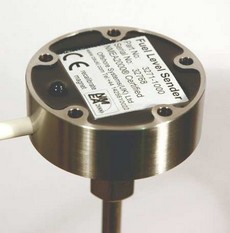Offshore Systems 3271, the perfect fuel tank sensor?

This Offshore Systems fuel sender sounds perfect…stainless steel with no moving parts, measures fuel tank level to 1% accuracy, installs and delivers data all via a NMEA 2000 trunk line, and it can reportedly detect water in the fuel! However, it costs $295 with a 20” probe, more with longer (cutable) probes, and I’m just a tiny bit dubious about the water sensing capability. This sensor is “capacitive”, which I think means it uses the same technology as the “dielectric” bilge pump switches I discussed here once. If the Offshore sender detects water in your fuel it sends alternating “full” and “empty” signals. I wonder if a small amount of water might trigger this, and then you wouldn’t know how much fuel you had? Maybe I’m just being paranoid, but I’d like to hear about successful field trials. Note that Offshore has a new 3125 2000 Sender Adapter which will work with standard resistive senders, and thus with any fluid {corrected 11/28; it turns out that Maretron is not distributing Offshore's sensors (but is working on its own NMEA 2000 tank sender adapter)}.
Update 11/26: I got this note from Offshore Systems: �The water sensing feature really works. Whenever the bottom of the probe detects water the sender sends alternate tank full / tank empty messages at the default rate of 1 message every 2.5 seconds. This will make any display very noticeable to the user to indicate that this tank is contaminated and should not be used until it has been drained and cleaned.� Sounds good�like a little water floating on half a tank of diesel�where it won�t really cause problems�also won�t set off the alarm and stop tank level measuring.
 Share
Share
Let's hear it for good old sight glasses.